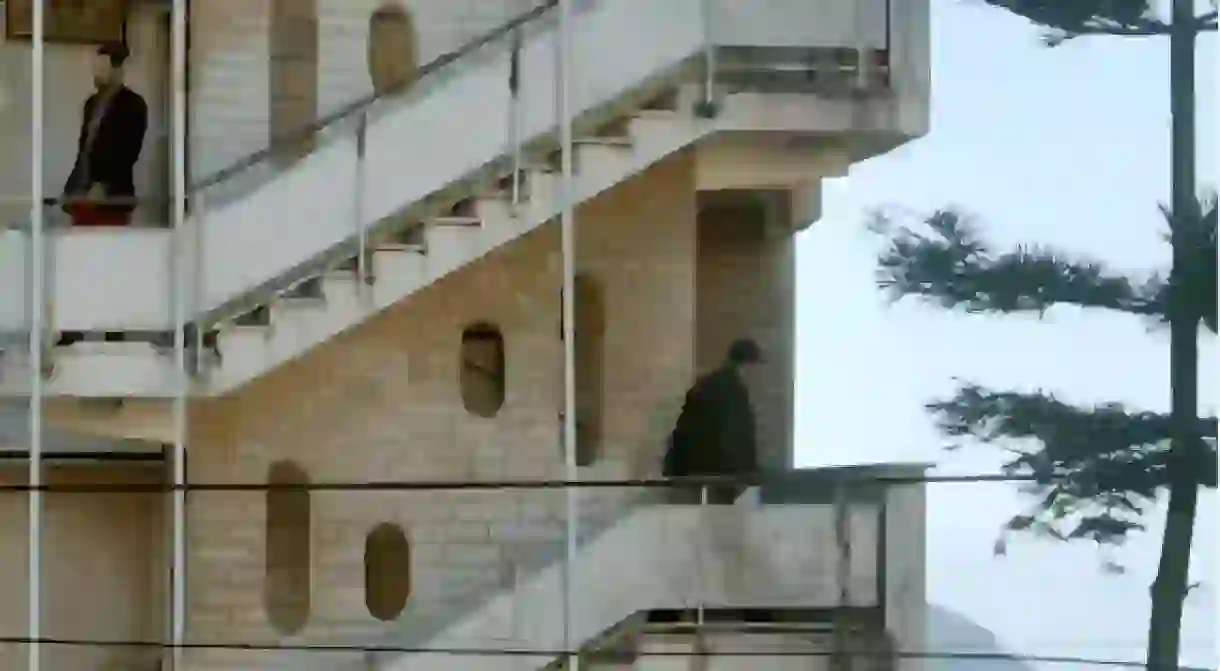This Palestinian Filmmaker is Paving the Way for Middle Eastern Cinema

Back in 2004, Filmmaker Magazine named the Palestinian writer and director Annemarie Jacir as one of the “25 new faces of independent cinema”, after releasing a handful of short films to wide acclaim. Since then, Jacir has collected dozens of accolades from film festivals around the world, including Cannes and Berlin, as well as achieving worldwide recognition. Her new release, Wajib, is a darkly comic and relatable portrayal of a father-son relationship, as well as the distinctly Palestinian tensions that arise between tradition and modernity, diaspora and homeland, and generation to generation. It proves that her films are still as poignant and relevant as ever.

Born in 1974 into one of the oldest and most established Palestinian Christian families (whose mansion, the Jacir Palace in Bethlehem, has now been converted into a five-star Intercontinental Hotel), Jacir grew up in a modest household in Riyadh, Saudi Arabia. She attended high school in Dallas and college in California, before completing her Masters in Film at Columbia University in New York City. Jacir subsequently began writing and directing her own short films, and rose to fame with her 2003 mockumentary-style short, Like Twenty Impossibles. It was a bleak but poetic depiction of life under occupation, centring entirely on one Palestinian film crew’s encounter with Israeli forces at a West Bank checkpoint. The film picked up a series of awards, and was included in the official selection at Cannes that year.
Her 2008 feature-length debut, Salt of this Sea, tells the story of Soraya, played by Suheir Hamad, a Palestinian woman born and bred in Brooklyn. Soraya returns to her grandfather’s native Jaffa and unsuccessfully tries to exchange some of his old coins. In a darkly funny but telling portrayal of the eternal question that dogs the Israeli-Palestinian conflict (what belongs to whom?), Soraya’s coins are rejected and she decides to take matters into her own hands. In a dramatic turn, she robs the bank for the amount she, her grandfather, and in essence her people, are owed.
Jacir’s talents lie in using the fictional form to focus on deeply realistic portrayals of everyday people, who then fall into extraordinary situations. She constructs a sort of dream reality that embodies the fantasy of many Palestinians of being able to take back what is theirs.
This magical blending of escapist fantasy and gritty reality is also a prominent feature of her 2012 film, When I Saw You. The film depicts a mother and son living alone together in the Harir Refugee Camp in Jordan in the wake of the 1967 war, which left 300,000 Palestinians displaced. The son, Tarek, in a bid to find his father who still lives in Palestine, runs away and finds himself adopted by a group of self-governing Palestinian militants living in the desert. His mother, in an attempt to find him, gets swept up into the group of rebels. Embodying a widely shared Palestinian fantasy of escape and freedom, the film brings magic to the bleak reality of displacement and stagnant refugee camps, as lived by millions of Palestinians over the past century. At the same time, the tender and at times comic portrayal of a mother trying to protect her son is deeply relatable, and the mixture of humour and warmth against a backdrop of an all-too-real story of hardship is a signature of Jacir’s work.
Her recently released third feature film, Wajib (meaning ‘duty’ in Arabic) again focuses on the comedy, tension and tenderness of fractured family relations, this time in Nazareth. Nazareth is in northern Israel, and is home to the largest community of Arabs, predominantly Christians, living inside the state of Israel. This gives them the difficult status of ‘Israeli Arabs’, who identify as Palestinians but live as Israeli citizens. Saleh Bakri, who appeared previously as Jacir’s male protagonist in Salt of this Sea and When I Saw You, plays Shadi, a Palestinian architect living in Italy. Shadi must return home to Nazareth in the run-up to his sister’s wedding, when he and his father, Abu Shadi (played by Saleh Bakri’s own father, the revered Palestinian actor Mohammed Bakri) partake in the traditional duty of hand delivering wedding invitations to hundreds of friends and relatives. Most of the action takes place inside the car, or in the eclectic and often eccentric households visited by the pair.
Enduring past tensions between the pair are revived, such as Abu Shadi’s disdain for Shadi’s relationship, job, and gaudy fashion sense. These tensions are relatable to anyone with a parent or child, and make for many comic moments, being perhaps Jacir’s funniest film yet. However, they also highlight the persisting tensions felt between Palestinians living inside Israel and Palestine, and in the diaspora–of being caught between preserving traditions as a form of resistance to the brutal occupation, and being a forward-thinking and productive population.
https://www.instagram.com/p/BXtP6CzgdG_/?hl=en&tagged=annemariejacir
Jacir’s storytelling voice is still one of the loudest and most important in the world of international cinema. Drawing on the hard-hitting reality and difficulties faced by Palestinians, whether in the homeland or the diaspora, Jacir still gives us hope of the Palestinian will triumphing over the oppression and suffocation of their current situation. She makes us laugh all the way, with her relatable depictions of the everyday. Deservedly, Wajib has been chosen as the Palestinian entry for the 2017 Academy Award for Best Foreign Language Film. It’s her third film to do so.














